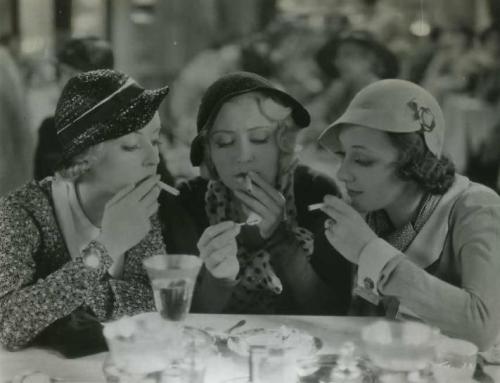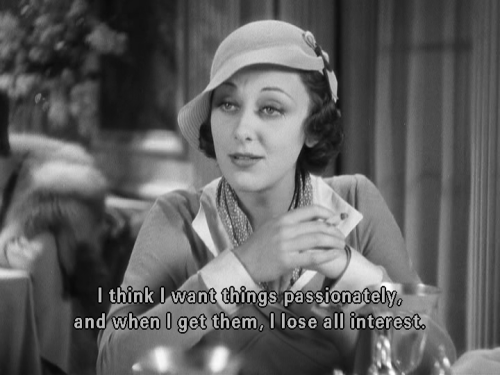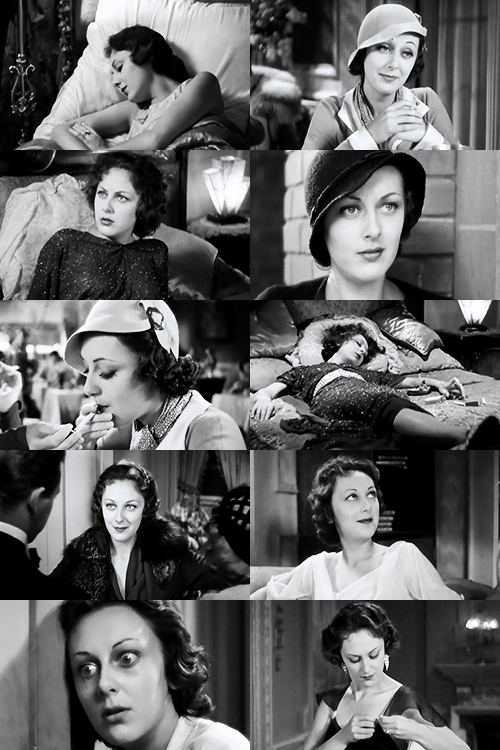ESTE
ARTIGO CONTÉM SPOILERS.
THIS
ARTICLE HAS SPOILERS.
Durante a Primeira
Guerra Mundial, havia a superstição que dizia que, se três pessoas acendessem
seus cigarros no mesmo fósforo, uma delas morreria em pouco tempo. Uma
justificativa era que um fósforo aceso durante vários segundos chamaria a
atenção do exército inimigo, e os três fumantes seriam bombardeados. Mais
tarde, descobriu-se que essa superstição era só uma jogada de marketing para
vender mais fósforos! Mas este filme da Warner Brothers de 1932 mostra que o
melhor mesmo é acreditar nas superstições...
During
World War First, there was a superstition saying that, if three people light
their cigarrettes with the same match, one of them will die soon. One
justification for the belief was that a match lit for several sconds would call
the attention of the enemy, and the three people with the cigarrettes would be
shot down or bombed. Later, it was discovered that this superstition was only a
way companies found to sell more matches! But this Warner Bros film from 1932
shows us that sometimes it's better to believe in superstitions...
O ano é 1919. Vivian
Revere, Mary Keaton e Ruth Westcott estudam juntas na Escola Pública número 62.
Vivian é popular, Ruth é aplicada, e Mary desobedece às regras. Seis anos
depois, Vivian (Ann Dvorak) está no colégio interno sonhando com romance, Ruth
(Bette Davis) estuda datilografia e Mary (Joan Blondell) foi parar em um
reformatório.
The
year is 1919.Vivian Revere, Mary Keaton and Ruth Westcott study at Public
School Number 62. Vivian is popular, Ruth is a bookworm and Mary doens't follow
the rules. Six years later, Vivian (Ann Dvorak) is in boarding school dreaming
about romance, Ruth (Bette Davis) suties typing and Mary (Joan Blondell) went
to a reformatory.
O ano agora é 1930, e
as três mulheres se reencontram. Vivian, apesar de ter uma vida considerada
perfeita, está infeliz. Ela tem um marido rico e compreensivo, Robert Kirkwood
(Warren William), um filho fofo e vive com luxo e conforto. Mesmo assim, ela
confessa ter inveja das ex-colegas, que precisam trabalhar duro para conseguir
o que querem.
The
year is now 1930, and the three friends meet again. It looks like Vivian has a
perfect life, but she is unhappy. She has a rich and understanding husband,
Robert Kirkwood (Warren William), a cute son and lives with luxury and comfort.
But she confesses she is jealous of her former mates, who must work hard to get
what they want.
Deprimida, Vivian vai
fazer uma viagem internacional de navio e leva o filho consigo. Mary está no
mesmo navio, se despedindo de um amigo. Mary apresenta seus conhecidos a Vivian
que, depois de beber e dançar com um deles, Loftus (Lyle Talbot), ela decide
que não vai mais viajar. Vivian vai viver com Loftus, e leva seu filho junto.
Não vai demorar para que Mary e Ruth interfiram na situação, e tudo fica mais
difícil quando criminosos aparecem para cobrar uma dívida de Loftus. Preste
atenção: em um pequeno, mas importante, papel como criminoso está Humphrey
Bogart!
Vivian
is depressed, and decides to go on an international sea trip and takes her son
with her. Mary is aboard the same boat, saying goodbye to a friend. Mary
introduces her acquaintances to Vivian. After she dances and drinks with one of
them, Loftus (Lyle Talbot), Vivian decides that she'll leave her husband, live with Loftus and take
her son with her. It don't be long until Mary and Ruth have to interfere, and
everything gets more difficult when criminals appear to 'ask' Loftus to pay a
debt. Pay attention: in a small, but important role as a criminal, we can see
Humphrey Bogart!
O filme tem apenas
63 minutos, e o foco é na personagem de Ann Dvorak. Seria interessante,
entretanto, haver um aprofundamento na personagem de Joan Blondell, que
certamente teria várias nuances e poderia nos surpreender. Bette Davis tem
muito pouco a oferecer como a nerd da
turma que precisa trabalhar duro e acaba se tornando... babá. Bette ainda
estava no início da carreira, sofreu com a antipatia do diretor Mervin LeRoy e,
embora tenha trabalhado em vários filmes pre-Code,
são suas colegas de cena que ficaram mais associadas com esta época da história
do cinema.
The
film is only 63 minutes long, and focuses on Ann Dvorak's character. However,
it'd be interesting if Joan Blondell's cahracter could be deeper explored: she
certainly would have several nuances and could surprise us. Bette Davis has
little to offer as the nerd girl who has to work hard and ends up as a … nanny.
Bette was still in the beginning of her career, and she didn't get along with
director Mervin LeRoy. Although Bette has worked in many pre-Codes, her two
co-starring actresses are the ones most often associated with the pre-Code era.
Ann Dvorak, recém-saída
de sua maior atuação em “Scarface – a Vergonha de uma Nação” (1932), está muito
bem como protagonista. O filme funciona, obviamente, como uma lição de moral
para as mulheres. Nos pre-Codes, é
normal que mulheres casadas e com filhos sejam punidas quando traem o marido e
abandonam a família. O mesmo não acontece com as mulheres solteiras que seduzem
homens casados, e o exemplo mais contundente disso é Jean Harlow em “A Mulher
Parisiense dos Cabelos de Fogo”, também de 1932.
Ann
Dvorak, coming from her best performance in “Scarface” (1932), is a very good
leadin lady. Thefilm works, obviously, as a cautionary tale for women. In
pre-Codes, it's common that married women, with children, are punished when
they leave their families. The same, however, doesn't happen to single women
who get involved with married men, and the best example of this is Jean Harlow
in “Read-Headed Woman”, also released in 1932.
Muitos filmes pre-Code são escandalosos mesmo para
quem os vê no século XXI. “Três... Ainda é Bom”, entretanto, será melhor
apreciado se olharmos para ele com a mentalidade de 1932. Há detalhes muito
sutis que podem escapar a uma plateia acostumada a receber tudo muito bem
explicado (exemplo: no GIF acima, o fato de Ann coçar repetidamente o nariz
sugere que ela estava usando drogas. Você percebeu isto?). Outros fatos também
ressoam com mais força para o público de 1932, como o sequestro de Junior que
lembra o de Charles Lindbergh Jr, e também a própria moral da história de que
uma vida boêmia e louca, a la Gatsby,
leva à autodestruição. Veja, sim, este filme – mas usando seu cérebro como uma
máquina do tempo.
Many pre-Code movies are
scandalous even for today's standards. “Three on a Match”, on the other hand, will be better appreciated
if we look at it from 1932's perspective. There are very subtle details that
may escape an audience that is used to have everything perfectly explained to
them (for instance: in the GIF above, Ann scratching her nose several times
suggests that she is using drugs. Have you realized that?). Other facts also
were more meaningful for the 1932 audience, like Junior's kidnapping being so
similar to Charles Lindbergh Jr's, and also the whole moral of the story: a
crazy bohemain life, a la Gatsby, xcan only cause self-destruction. Yes, you
must watch this film – but be sure to use your brain as a time machine while
you do it.
This is my contribution to
the Bette Davis Blogathon, hosted by my friend Crystal at In the Good Old Days
of Classic Hollywood.





nossa, não conhecia. beijos, pedrita
ReplyDeleteThis movie sounds lovely, and I love Joan Blondell! You make a great point here, "The movie will be better appreciated if we look at it with the mindset of 1932". It is fascinating how movies are made for a specific audience, and you have to put yourself in the mindset to understand the choices of the characters.
ReplyDeleteI will check this film out.
Ciao!
Summer
serendipitousanachronisms.wordpress.com
You know, I just discovered this film in a DVD set I've owned for a few years. I'm not sure how I overlooked this one, but your review has prompted me to see it ASAP!
ReplyDeleteIt sounds like a shame that Joan Blondell's character wasn't more fully developed...
And thanks for the reminder that when watching these films, we have to remember they were made for a Depression-era audience. Valuable advice!
I like this film a lot - Ann Dvorak is fantastic in it, although it's a shame Blondell and Davis don't get more screen time too. I also like Bogart in his small part - I remember the scene where he says "Boo hoo". Good post, Le!
ReplyDeleteArtigo muito bom! Ainda tenho de ver o filme, esta na minha lista ha anos!
ReplyDeleteCarol
O que falar desse post e desse blog?? Foi uma grata surpresa conhece-lo.
ReplyDeletePode ter certeza que a partir de hoje ganhou mais uma visitante assídua!
Parabéns pelo trabalho!!!!
Enrolados: your blog about everything